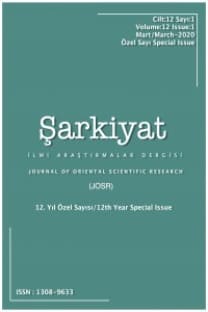CİLALANMIŞ KAHRAMANLAR: AMERİKAN KURGUSUNDA SAVAŞ YÜZLERİ
Phil Klay, savaştaki deneyimlerini edebiyat eserlerine dönüştüren birçok Amerikan savaş gazisinden biridir. Klay, ilk öykü koleksiyonunda (ilk olarak 2014'te yayınlandı), çok yönlü bakış açıları ve savaşa ilişkin içgörüler sağlamak için farklı geçmişlere ve mesleklere sahip karakterleri kullanıyor. Bu çalışma, öykülerdeki hizmet üyelerini Afganistan (2001) ve Irak'taki Savaşı (2003) kahramanlık / post-kahramanlık yönündeki davranışları bağlamında incelemektedir. Post-kahramanlık, askerlerin başarılarının ihtişamıyla daha az endişe duydukları ve kendi hayatta kalmalarına daha fazla takıntılı oldukları için mevcut savaşlarda kahramanca zihniyetin azaldığını açıkladı. Bu makale, koleksiyonunun savaş temsilinin iki yönünü, özellikle de askerlerin duygusal ve psikolojik etkileşimlerini, savaşta ve savaştan sonra ölümcül deneyimlerle birlikte, askerlerin orduya katılımının ardındaki itici güçleri araştırmaktadır. Klay’ın hikayeleri savaş sahneleri ile dolu olsa da, karakterler cesaretin ihtişamından ziyade korkunç savaş gerçekliği ile meşgul. Savaş, oldukça kasvetli bir bakış açısını yansıtan on iki anlatıcı aracılığıyla çatışan hassasiyetler ve motivasyonlar içinde şekillenir.
Anahtar Kelimeler:
Phil Klay, Irak, post-kahramanlık, savaş kurgu
TARNISHED HEROES: FACES OF WAR IN AMERICAN FICTION
Phil Klay is one of many American war veterans to mould their experiences in war into works of literature. In his first story collection, Redeployment (first published in 2014), Klay employs first person narrators with diverse backgrounds and occupations to provide multi-faceted perspectives and insights into war. This study examines service members in these stories within the context of the 2001 War in Afghanistan and 2003 War in Iraq and their behaviour in terms of heroism/post-heroism. Post-heroism declares the decline of heroic mindset in present wars since soldiers are less concerned with the grandeur of achievements and more obsessed with their own survival. This paper investigates two aspects of the collection’s representation of war, specifically, soldiers’ emotive and psychological interaction with lethal experiences in and after war in addition to impetuses behind soldiers’ involvement in the military. Even though Klay’s stories are abundant with combat scenes, characters are preoccupied with the appalling reality of war rather than grandeur of valour. War is framed within conflicting sensitivities and motivations through twelve narrators which reflect a rather gloomy perspective.
Keywords:
Iraq, war fiction, Postheroism, Phil Klay,
___
- Altheide, David L. - Grimes, Jennifer N. “War Programming: The Propaganda Project and The Iraq War”. The Sociological Quarterly 46/4 (2005): 617-643.
- Anderson, Donald. “You Can't Come Home Again: Phil Klay's Redeployment”. WLA; War, Literature and the Arts 26 (2014): 1.
- Booth, Allyson. “Thank You for Your Service: Negotiating the Civilian-Military Divide in Phil Klay’s Redeployment”. Texas Studies in Literature and Language 61/2 (2019): 168-192.
- Coker, Christopher. Waging War without Warriors? The Changing Culture of Military Conflict. Boulder: Lynne Rienner, 2002.
- Docx, Edward. “Redeployment by Phil Klay Review-‘Incendiary Stories of War’”. The Guardian, 2014. https://www.theguardian.com/books/2014/mar/26/redeployment-phil-klay-review-incendiary-stories-of-war
- Filkins, Dexter. “The Long Road Home”. The New York Times, 2014. https://www.nytimes.com/2014/03/09/books/review/redeployment-by-phil-klay.html
- Golub, Andrew - Bennett, Alexander S. “Introduction to The Special Issue: Drugs, Wars, Military Personnel, and Veterans”. Substance use & misuse 48/10 (2013): 795-798.
- James, William. The moral equivalent of war, and other essays. New York: Harper & Row, 1971.
- Kakutani, Michiko. “The Madness of War Told in the First Person”. The New York Times, 2014. https://www.nytimes.com/2014/02/27/books/redeployment-iraq-war-stories-by-phil-klay.html
- Klay, Phil. Redeployment. New York: Penguin, 2015.
- Kunsa, Ashley. Reconstructing the War in Iraq: Post-9/11 American War Fiction in Dialogue with Official-Media Discourse. PhD Dissertation, Duquesne University, 2017.
- Luttwak, Edward N. “Toward Post-Heroic Warfare”. Foreign Affairs 74/3 (1995): 109-22.
- Mayfield, Tyrell O. “Reflections on Redeployment”. WLA; War, Literature and the Arts 28 (2016): 1.
- Packer, George. “Home Fires: How Soldiers Write Their Wars”. New Yorker, 2014. https://www.newyorker.com/magazine/2014/04/07/home-fires-2
- Petrovic, Paul. “Beyond Appropriation: Arab, Coptic American, and Persian Subjectivities in BrianTurner’s Here, Bullet, Phil Klay’s Redeployment, and Elliot Ackerman’s Green on Blue”. War, Literature & the Arts: an international journal of the humanities (2018) 30.
- Powers, Kevin. The Yellow Birds. New York: Little, Brown and Company, 2013.
- Ryan, Cheyney. “The dilemma of cosmopolitan soldiering”. Heroism and the changing character of war: toward post-heroic warfare? Ed. Sibylle Scheipers. 120-141. New York: Macmillan, 2014.
- Scheipers, Sibylle. “Introduction: Toward Post-Heroic Warfare?” Heroism and the changing character of war: toward post-heroic warfare? Ed. Sibylle Scheipers. 1-18. New York: Macmillan, 2014.
- Scranton, Roy. “The Trauma Hero: From Wilfred Owen to Redeployment and American Sniper”. Los Angeles Review of Books, 2015. https://lareviewofbooks.org/article/trauma-hero-wilfred-owen-redeployment-american-sniper/
- Short, Roxanna - Dickson, Hannah - Greenberg, Neil - MacManus, Deirdre. “Offending Behaviour, Health and Wellbeing of Military Veterans in The Criminal Justice System”. PLoS one 13/11 (2018).
- Smith, Erica. “Pornography and Sex Addiction in the Military”. Addiction Hope, 2014. https://www.addictionhope.com/sexual-addiction/pornography-sex-addiction-military/
- Başlangıç: 2009
- Yayıncı: Şarkiyat Araştırmaları Derneği
Sayıdaki Diğer Makaleler
YENİ BULUNAN AVÂRIZ DEFTERLERİNE GÖRE 17. YÜZYILIN İLK YARISINDA AMİD (DİYARBEKİR)
KUTSAL SAVUNMA ŞİİRİNDE MİLLİ KİMLİK VE DİNİ DÜŞÜNCE ARASINDAKİ BAĞ
YORUMUN LİTERAL ANLAMINI AŞMASI: SUFİ TE’VİLDE ANLAM GENİŞLEMESİ, CENNET VE NAR (CEHENNEM) ÖRNEĞİ
OSMANLI MODERNLEŞME DÖNEMİNDE BİR TAŞRA OKULU: MALATYA ERKEK RÜŞDİYESİ (1870-1899)
TİMURLU DEVLET ADAMLARINDAN EMİR ŞAH MELİK
KIRSAL ALANDAKİ ENGELLİLERİN SORUNLARI VE ETKİLEŞİM FARKLILIKLARI
13. YÜZYILDA KONYA’NIN BİR İLİM MERKEZİNE DÖNÜŞMESİNDE İRANLI ÂRİFLERİN ROLÜ
KLASİK TÜRK ŞAİRLERİ İÇİN ÖRNEK BİR ŞAHSİYET: HASSÂN B. SABİT
